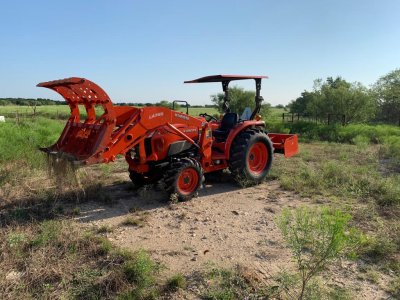rocfarm
Well-known member
By the time I paid for my second-hand tractor, 13 pieces of maintenance and farming equipment, including a used 2003 Ford F-150, water troughs, well, piping to the troughs, and various fencing materials, I was in over 50,000$. And I still borrow my friends trailer and 90%of my tools are from my dad. And I still had to pay for the cows and their upkeep. Not to mention land taxes, truck insurance, diesel, gas, and things like remedy ultra (spent $750 spraying mesquites alone last summer) and backpack sprayers and tractor maintenance costs. It'd take about 40 head to efficiently pay that off over time, I think.Yes, this is correct. I want to grow, and plan to buy a tractor one time. Of note, I am well into middle age, fully disabled but one stubborn SOB, and am approaching farming/ranching as an opportunity to enjoy the years I have left, to learn, and to perhaps hand this off to one of my children. Whether equipment pays for itself is immaterial, as my costs to start the farm up from scratch are substantial and my timeline is shorter than if I started young. The farm will likely never pay off what I invest into it. This is a lifestyle choice for me. Any of us could end up in a wheelchair tomorrow, and I don't want to say I never tried the ag lifestyle because I wrote myself off due to disability.
Perhaps I am not understanding the financial aspects. I cut 300 regular sized square bales on 3 acres of unused ground in July for $1.25 apiece. Those bales could be sold for $10 apiece. That's $2625 profit. OR, I could hang onto them to avoid the cost of buying hay for my sheep this winter. Maybe someone should educate me on why a tractor can't pay for itself over time. It won't happen quickly, but I have more acres I could hay. Also opens up opportunities to make some cash on the side haying for other people. Also allows me to maintain my property (haha). Perhaps there are some tax breaks in there as well.
But you are right about haying. If you forget the cows and completely focus on hay, it was one of the few scenarios that Texas A&M folks said could potentially pay off.
Running cattle is a consistent loser, though. Most of us are made whole by land cost appreciation and the recreational side. I love my hunts on the farm! Turkey, deer, dove, wild pigs, coyotes, foxes, bobcats, raccoons, opossum… and when I feel like it. It's also nice to have ones own private gun range and build a camp fire under the stars at one's whim. And the physicality of it keeps me fit.
So I totally get the lifestyle choice. May your children adopt the lifestyle as well! It's a meaningful choice.
Here's my tractor, BTW. Kubota L4701. A great tractor for 160 acres of maintenance in central Texas.
Attachments
Last edited:


